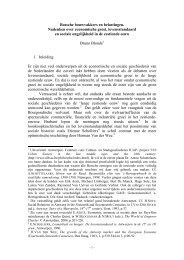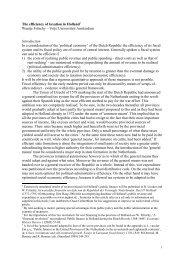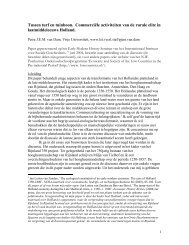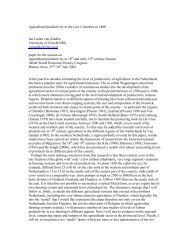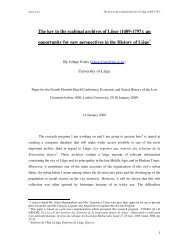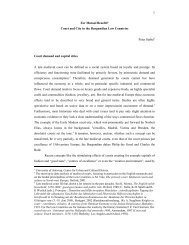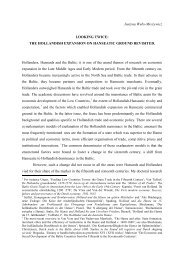Amsterdam as the cradle of modern futures and options trading ...
Amsterdam as the cradle of modern futures and options trading ...
Amsterdam as the cradle of modern futures and options trading ...
You also want an ePaper? Increase the reach of your titles
YUMPU automatically turns print PDFs into web optimized ePapers that Google loves.
have been keen to impose restrictions on forward <strong>trading</strong> to counter price rises <strong>of</strong> staple foods,<br />
or to protect small investors. 13 On <strong>the</strong> o<strong>the</strong>r h<strong>and</strong>, for forward contracts to become <strong>futures</strong>,<br />
<strong>the</strong>y need to be cut loose from <strong>the</strong> original contracting parties <strong>and</strong> transformed into a<br />
st<strong>and</strong>ardized unit. This requires <strong>the</strong> underlying goods to be fungible, that is in ample supply<br />
<strong>and</strong> <strong>of</strong> a st<strong>and</strong>ard quality allowing <strong>the</strong> substitution <strong>of</strong> one lot for any o<strong>the</strong>r one. Moreover, <strong>the</strong><br />
contracts <strong>the</strong>mselves must be st<strong>and</strong>ardized <strong>and</strong> underpinned by clear procedures to wind up<br />
transactions <strong>and</strong> to deal with disputes.<br />
It is very useful, but not strictly necessary, for such procedures to include regular<br />
clearing arrangements <strong>and</strong> coverage <strong>of</strong> counter-party risk. Clearing, or rescontre <strong>as</strong> it w<strong>as</strong><br />
called in <strong>the</strong> seventeenth century, is <strong>the</strong> periodical settlement <strong>of</strong> mutual claims. Clearing<br />
creates concentrated liquidity. 14 Canceling out <strong>the</strong> claims against each o<strong>the</strong>r allows <strong>the</strong><br />
settlement <strong>of</strong> transactions with payments worth but a fraction <strong>of</strong> <strong>the</strong>ir total portfolio. Clearing<br />
institutions may also provide cover for losses emanating from defaulting market participants.<br />
Both elements make <strong>the</strong> market more efficient, clearing by lowering <strong>the</strong> cost <strong>of</strong> settlement,<br />
counter-party cover by reducing <strong>the</strong> risk <strong>of</strong> defaults creating a chain reaction. 15<br />
2. Antwerp <strong>and</strong> <strong>Amsterdam</strong><br />
Even if stock <strong>trading</strong> figured most prominently in Penso de la Vega’s Confusion de<br />
confusions, derivatives first appeared in commodity trade. Indeed, forward <strong>trading</strong> in bulk<br />
commodities such <strong>as</strong> grain, salt, wool, <strong>and</strong> herring appeared already in ancient <strong>and</strong> medieval<br />
times. 16 However, before <strong>the</strong> middle <strong>of</strong> <strong>the</strong> sixteenth century, <strong>the</strong>se transactions only involved<br />
merchants <strong>and</strong> producers <strong>trading</strong> <strong>the</strong> se<strong>as</strong>on’s expected crop or catch. 17 Even <strong>the</strong> greatest<br />
medieval fairs, justly famous for <strong>the</strong> clearing facilities <strong>the</strong>y <strong>of</strong>fered to merchant bankers,<br />
never saw a regular trade in derivatives emerge. Besides <strong>the</strong> fact that very few commodities <strong>of</strong><br />
st<strong>and</strong>ard quality were exchanged, <strong>the</strong> intermittent character <strong>of</strong> <strong>the</strong>se fairs simply did not allow<br />
<strong>the</strong> continuous pricing necessary for derivatives <strong>trading</strong>.<br />
New opportunities for this trade arose when <strong>the</strong> system <strong>of</strong> periodical fairs began to<br />
give way to permanent exchange in cities that combined seaborne <strong>and</strong> overl<strong>and</strong> trade. 18 In <strong>the</strong><br />
fifteenth century Venice became a city <strong>of</strong> perpetual fairs, where “trade <strong>and</strong> <strong>the</strong> clearance <strong>of</strong><br />
payments were possible throughout <strong>the</strong> year”. 19 Still, turnover continued to be highest in<br />
midwinter <strong>and</strong> early summer, when <strong>the</strong> Venetian fleets sailing to <strong>the</strong> e<strong>as</strong>tern Mediterranean<br />
<strong>and</strong> northwestern Europe departed <strong>and</strong> returned, respectively. 20 A complete shift away from<br />
periodical fairs to permanent markets w<strong>as</strong> first accomplished in Antwerp. Until <strong>the</strong> late 15 th<br />
4



